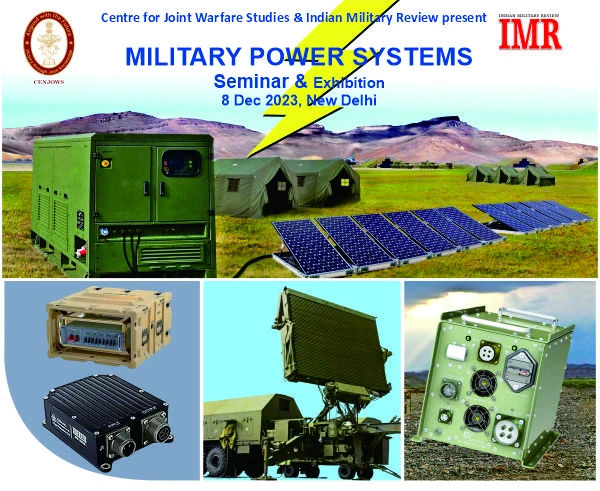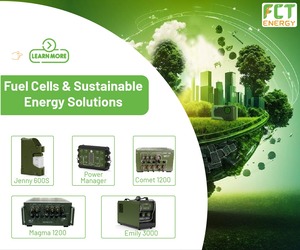A Curtain Raiser
The Centre for Joint Warfare Studies (MoD Think Tank) and Indian Military Review are organising Military Power Systems 2023 seminar & exhibition on 8 Dec 2023 at New Delhi.
Military equipment often requires power systems that can withstand harsh environments and extreme conditions, such as high temperatures, shock and vibration, and electromagnetic interference. Additionally, these power systems must be able to operate in remote locations and be able to function under a wide range of temperatures.
The requirements of military equipment can vary widely depending on the type of equipment. It may be required to operate for extended periods of time without maintenance, which means that the power systems must be highly reliable and have long service lives. They must be lightweight and compact, so as to minimize the overall weight of the equipment.
Military grade power management systems such as battery management systems must be able to monitor and control the power source and provide a reliable power source heat management systems, must be able to dissipate heat effectively and prevent damage to the power source.
Recent Developments
There have been several recent developments in providing lightweight military equipment with a reliable and long-lasting power source that is lightweight and compact, thus increasing the mobility and autonomy of the equipment. Some of the most notable include:
Lithium-ion Batteries: These have a high energy density, which allows for long-lasting power in a lightweight package. They also have a long service life and can be rapidly charged.
Fuel Cells: Highly efficient, lightweight, long-lasting power source, which can operate in remote locations.
Solar Power: Solar panels are a lightweight, long-lasting power source that can be used to generate electricity in remote locations. They can be integrated into military equipment.
Microgrids: Microgrids are small-scale power systems that can be used in remote locations to provide power to a single piece or to a group of equipment.
Hybrid Power Systems: These systems combine multiple power sources, such as batteries, fuel cells, and generators, to provide a reliable and long-lasting power source.
Power Systems for Drones
Small and large drones have different power system requirements, but some general requirements are common to both. Drones have limited space for power systems, so the energy density of the power source must be high to provide a long-lasting power source in a small package. Lithium-ion batteries and fuel cells are commonly used for this reason.
Power system must be highly reliable for drones to be able to fly for extended periods without maintenance.
Drones are susceptible to Electromagnetic Interference (EMI) and Electromagnetic Compatibility (EMC) issues.
For large drones, the long-lasting power source must be able to provide a high level of power output.
Harsh environments mean the power system must be able to withstand extreme temperatures, humidity and other environmental factors.
Power Systems for Fighter Aircraft
Fighter aircraft need to power the various systems on the aircraft, other than engines, ie, avionics and weapons systems. Weight is critical, hence, power system must be lightweight as well with high power-to-weight ratio.
For flying for extended periods of time without maintenance, the power system must be highly reliable and safe to use in punishing environments.
Power Systems for Submarines
Submarines have limited space for power systems. They need to be able to operate for extended periods of time without maintenance, in a high-pressure underwater environment, quietly to avoid detection.
Auxiliary power systems for submarines have several special requirements, including Compactness, high reliability, Safety, generate minimal noise and vibration, minimum downtime, and withstand the high pressure and low temperature of the underwater environment.
Power Systems for Soldiers
Soldiers need to carry their own equipment in the field in remote locations and operate in different harsh environment. Power systems for soldiers must be lightweight to minimize the load on the soldier, must have a high energy density to provide long-lasting power source in a small package and be reliable and safe in a variety of environments.
The power source must be durable to withstand rough handling and rugged conditions, and low in maintenance and, at the same time, must be flexible and adaptable to different power needs depending on the mission.
Power Systems for Tanks
Besides the power pack, tanks require auxiliary power to operate the various systems on the tank, such as weapons systems, and communications equipment. They need to be able to operate for extended periods of time without maintenance.
Power Systems for Military Communications
Military communications have several special requirements, primarily EMI/EMC compatibility, portability and ruggedness.
Missiles and Strategic Systems
Missiles and strategic systems need to be able to operate for extended periods of time without maintenance. They are susceptible to EMI and EMC issues, and have limited space for power systems. Redundancy and safety factors are important in the case of missiles.
Alternate Sources of Power
There are increasing calls for military vehicles and equipment to reduce carbon emissions. Alternate sources of power are being explored.
Electric power can be generated from a variety of sources, such as solar, wind, and hydro, which are all renewable and produce no emissions. Electric power can be stored in batteries and used to power military vehicles and equipment.
Hybrid power systems, combining internal combustion engines with electric motors and batteries can improve the fuel efficiency of military vehicles and equipment.
Fuel cells, which convert chemical energy into electricity and can be powered by hydrogen, a clean-burning fuel that produces only water vapor when burned, can be used to power military vehicles and equipment.
Biofuels, such as biodiesel and bioalcohol, are being tried in transport aircraft.
Propane, natural gas, solar energy, are other alternatives to traditional fossil fuels, with lower carbon content, which can be used to power military vehicles and equipment.
Critical Components and Materials
Military grade power sources and power systems require specialized components and materials that can withstand harsh conditions and demanding environments.
Military grade fuel cells typically use platinum and ceramics. Solar panels are typically made with materials such as silicon and glass.
Military grade power electronics, such as inverters and converters, use materials such as silicon and ceramic. Military grade cabling and connectors use materials such as copper and fibre optics.
Common Factors
Military equipment is required to be used for extended periods of time without maintenance, in a variety of environments, rough terrain and harsh conditions, including hot and cold temperatures. They cannot be allowed to fail.
Military systems have limited space for power systems. They are susceptible to EMI and EMC issues.
The power sources need to provide long-lasting power, be portable and utilize minimum fuel and increase the system’s endurance. The power source must be compact to fit in the limited space.
The power system must have built-in redundancy, be able to withstand extreme temperatures, humidity, and other environmental factors.
The power system must be highly reliable and safe to use, EMI/EMC compatible, provide for redundancy, climate resistance (extreme temperatures, humidity), and be compact to fit in the limited space.
==
Types of Military Power Systems
Military Grade Power Generators
Tactical Hybrid Generators
“Plug-n-play” Energy Hubs
Portable Power Hubs
Batteries and Stored Power
Advanced energy storage systems
Core Power Batteries
Battery Only Storage Systems
Expansion Battery Modules (for UPS)
Uninterrupted Power Supplies
UPS – Military Field-Grade
Military Power Inverters (MINV)
Programmable Power Supply (MPPS)
Military Power Conditioners (MPC)
Mil Converters and Filters
Military Grade Power Supply (MPS)
Military VPX Power Supplies
Military 3-Phase AC Changer (MAC)
Military Configurable Power Supplies (MTQ)
Smart Power Management Systems
Intelligent Power Management System
Energy Control System
Custom Military Power
Fully-Integrated Systems
Expeditionary Power
Emergency Power Kits
Powerpacks
Power Packs for land & marine systems
Auxillary power packs
Small engines for aircraft and drones
Custom Aerospace Power Supply
Custom Shipboard Power Supply
Custom Power for Ground Equipment
Rugged Power for Comms Equipment
Alternative Fuels
Renewable Energy Sources
Biofuel, Biogas



















